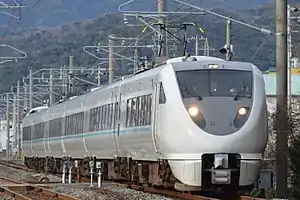289 series
The 289 series (289系, 289-kei) is a DC electric multiple unit (EMU) train type operated by West Japan Railway Company (JR-West) in Japan on limited express services in the Kyoto and Osaka area since October 2015. The trains were converted from former dual-voltage (1,500 V DC and 20 kV AC) 683-2000 series EMUs formerly used on Shirasagi services and made surplus following the 14 March 2015 timetable revision.
| 289 series | |
|---|---|
 A 6-car 289 series EMU in February 2016 | |
| Family name | Hitachi A-train, as for 683 series |
| Replaced | 381 series |
| Constructed | 2002–2005 (as 683 series) |
| Entered service | 31 October 2015 |
| Refurbished | 2015 (converted from 683 series) |
| Number in service | 76 vehicles (18 sets) (as of 1 May 2019) |
| Formation | 3/4/6 cars per trainset |
| Fleet numbers | FH301 – FH306, J01 – J05, I01 – I03, FG401, FG403, FG406, FG408 – FG411 |
| Operator(s) | JR West |
| Depot(s) | Fukuchiyama, Kyoto |
| Specifications | |
| Car body construction | Aluminium, double-skin |
| Electric system(s) | 1,500 V DC overhead catenary |
| Track gauge | 1,067 mm (3 ft 6 in) |
Operations
- ■ Kounotori, formed as 4- or 4+3-car sets
- ■ Kuroshio, formed as 6- or 6+3-car sets
- ■ Rakuraku Harima, formed as 6-car sets
The 289 series trains were initially introduced on 31 October 2015 on Hashidate, Kinosaki, Kounotori (formed as 4- or 4+3-car sets) and on Kuroshio services formed as 6- or 6+3-car sets services, displacing the remaining JNR-era 381 series EMUs.[2] Since the timetable revision on 26 March 2016, the 4- or 4+3-cars sets are used only on Kounotori services.[3]
While the trains are similar in appearance and performance characteristics to the 287 series trains, they cannot operate in multiple.[4]
Formations
As of 1 April 2016, the fleet consists of five six-car sets and three three-car sets (39 vehicles in total) based at Kyoto Depot for use on Kuroshio services, and seven four-car sets and six three-car sets (46 vehicles in total) based at Fukuchiyama Depot for use on Kounotori services.[3]
6-car Kuroshio sets
The six-car Kuroshio sets, numbered J01 to J05, are formed as follows.[4][3]
| Car No. | 1 | 2 | 3 | 4 | 5 | 6 |
|---|---|---|---|---|---|---|
| Designation | Tsc | T | M | T | T | Mc |
| Numbering | KuRo 288-20xx | SaHa 289-25xx | MoHa 289-34xx | SaHa 288-22xx | SaHa 289-25xx | KuMoHa 289-35xx |
Cars 1 and 4 each have one scissors-type pantograph.[3]
3-car Kuroshio sets
The three-car Kuroshio sets, numbered I01 to I03, are formed as follows.[4][3]
| Car No. | 7 | 8 | 9 |
|---|---|---|---|
| Designation | Tc | T | Mc |
| Numbering | KuHa 288-27xx | SaHa 289-24xx | KuMoHa 289-35xx |
Car 7 has one scissors-type pantograph.[3]
4-car Kounotori sets
The seven four-car Kounotori sets, numbered FG401, FG403, FG406, FG408 to FG411 and based at Fukuchiyama Depot, are formed as follows.[5][3]
| Car No. | 1 | 2 | 3 | 4 |
|---|---|---|---|---|
| Designation | Tsc | M | T | Mc |
| Numbering | KuRo 288-20xx | MoHa 289-34xx | SaHa 288-22xx | KuMoHa 289-35xx |
Cars 1 and 3 each have one scissors-type pantograph.[3]
From 2016, the KuRo 288-2000 cars were modified with only half of the car assigned as "Green car" (first class) seating, and reclassified KuRoHa 288-2000.[6]
Exterior
The sets based at Fukuchiyama Depot for use on Kounotori services are finished in the same livery as the Fukuchiyama-based 287 series EMUs also used on these services, with a thin maroon line below the windows.[7] The sets based at Kyoto Depot for use on Kuroshio services have an "ocean green" turquoise line below the windows.[7]
Interior
The 289 series trains feature western-style toilets, universal access toilets, and AC outlets for passenger use are provided on the end walls of the passenger saloons.
History
JR-West announced the first details of its plans to introduce the new 289 series trains on 28 April 2015. The first four-car set converted was test-run in May 2015.[5]
The trains entered revenue service from 31 October 2015, replacing older 381 series trains.[7]
The FH301 was returned to 683 series from April 2019.[8]
The FH306 was returned to 683 series from June 2019.[9]
References
- JR西日本 289系 10月31日から運転開始 [JR-West 289 series to enter service from 31 October]. Tetsudo Hobidas (in Japanese). Japan: Neko Publishing Co., Ltd. 21 August 2015. Retrieved 21 August 2015.
- Jr電車編成表 JR電車編成表 2016夏 [JR EMU Formations - Summer 2016] (in Japanese). Japan: Kotsu Shimbunsha. 20 May 2016. p. 145, 190. ISBN 978-4-330-68216-7.
- Kishi, Kenji (October 2015). JR西日本681・683系の現状 [The current situation with JR-West 681 and 683 series]. Japan Railfan Magazine (in Japanese). 55 (654): 30–31.
- 塗装変更された289系が本線で試運転 [Reliveried 289 series test run on main line]. Japan Railfan Magazine Online (in Japanese). Japan: Koyusha Co., Ltd. 28 May 2015. Archived from the original on 20 March 2016. Retrieved 11 December 2016.
- クロハ288形が登場 [KuRoHa 288 appears]. Japan Railfan Magazine Online (in Japanese). Japan: Koyusha Co., Ltd. 11 December 2016. Archived from the original on 11 December 2016. Retrieved 11 December 2016.
- 289系 営業運転開始 [289 series enters revenue service]. RM News (in Japanese). Japan: Neko Publishing Co., Ltd. 2 November 2015. Retrieved 3 November 2015.
- 289系FH301編成が683系に復帰し、金沢総合車両所へ [289 series FH301 returns to 683 series and it's to Kanazawa Depot.]. Japan Railfan Magazine Online (in Japanese). Japan: Koyusha Co., Ltd. 23 April 2019.
- 289系FH306編成が683系に復帰し、金沢総合車両所へ [289 series FH306 returns to 683 series and it's to Kanazawa Depot.]. Japan Railfan Magazine Online (in Japanese). Japan: Koyusha Co., Ltd. 20 June 2019.
External links
| Wikimedia Commons has media related to 289 series. |
- JR-West 28 April 2015 press release (in Japanese)